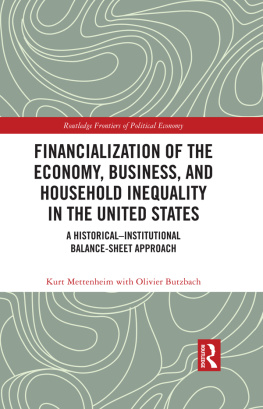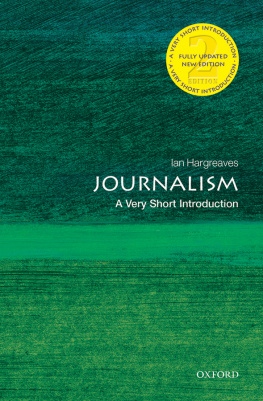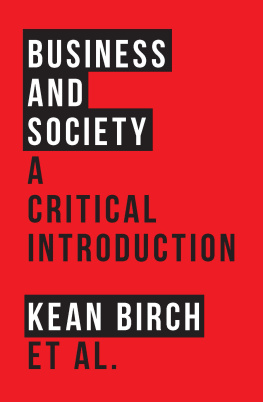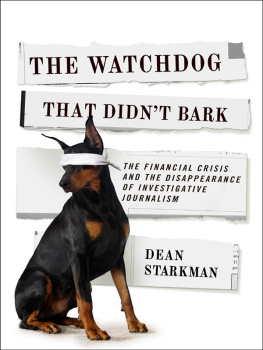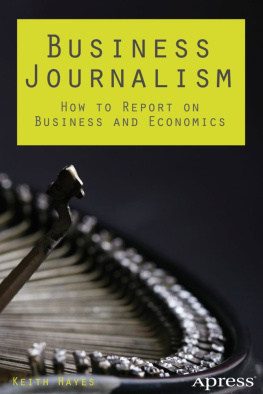Business Journalism
There are few areas of greater importance and more in need of critical analysis than business journalism. Ibrahim Seaga Shaw has done us all the great service of providing just such a thorough and valuable assessment in Business Journalism: A Critical Political Economy Approach. It is required reading for scholars and students of journalism, media and democracy.
Robert W. McChesney, University of Illinois at Urbana-Champaign
The huge expansion of business journalism in recent years reflects the ever increasing impact of corporate decisions and actions on all our lives. Yet this area of news making is rarely exposed to serious critique and analysis. Ibrahim Shaw has written an invaluable historical and theoretically informed account of business journalism, buttressed by detailed case studies and years of professional experience, that will provide this field with an authoritative and much needed major step forward.
Peter Golding, Professor in Media, University of Newcastle
Business Journalism: A Critical Political Economy Approach critically explores the failures of business journalists in striking the balance between the bottom line business model and their role in defending the public interest.
Drawing on historical and political economic perspectives and analysing these in relation to critical political economic theory, the book explores failures of business journalism through the dwindling of social responsibility in the business journalists role in holding political and corporate power to account.
Ibrahim Seaga Shaw draws on a diverse range of case studies, including:
investigative journalism in the Standard Oil and Enron scandals
corporate propaganda in relation to business reporting
financial journalism and the global financial crises of the late 1990s and 2008
public business journalism and the subprime mortgage loans, horsemeat and bent iPhone 6 scandals
ethical challenges of business and journalism from developed to emerging BRICS economies
business or financial journalism?: modernity vs postmodernity; macroeconomics vs microeconomics
challenges of business journalism in the digital age.
Business Journalism: A Critical Political Economy Approach is essential reading for students and scholars interested in understanding the historical failings and potential future for business journalism, and those wishing to develop specialist financial, economic and business reporting in todays globalised media landscape.
Ibrahim Seaga Shaw is Senior Lecturer in Media and Politics at Northumbria University in Newcastle upon Tyne. He is author of Human Rights Journalism (Palgrave Macmillan, 2012) and co-editor of Expanding Peace Journalism (Sydney University Press, 2012). He is also co-editor of Communicating Differences (Palgrave, forthcoming 2016) and obtained his PhD from the Sorbonne. He has a background in journalism spanning 20 years, having worked in Sierra Leone, Britain and France.
Business Journalism
A Critical Political Economy Approach
Ibrahim Seaga Shaw
First published 2016
by Routledge
2 Park Square, Milton Park, Abingdon, Oxon OX14 4RN
and by Routledge
711 Third Avenue, New York, NY 10017
Routledge is an imprint of the Taylor & Francis Group, an informa business
2016 Ibrahim Seaga Shaw
The right of Ibrahim Seaga Shaw to be identified as author of this work has been asserted by him in accordance with sections 77 and 78 of the Copyright, Designs and Patents Act 1988.
All rights reserved. No part of this book may be reprinted or reproduced or utilised in any form or by any electronic, mechanical, or other means, now known or hereafter invented, including photocopying and recording, or in any information storage or retrieval system, without permission in writing from the publishers.
Trademark notice: Product or corporate names may be trademarks or registered trademarks, and are used only for identification and explanation without intent to infringe.
British Library Cataloguing in Publication Data
A catalogue record for this book is available from the British Library
Library of Congress Cataloging in Publication Data
Shaw, Ibrahim Seaga, 1962
Business journalism : a critical political economy approach / Ibrahim Seaga
Shaw.
pages cm
1. Journalism, Commercial History. I. Title.
PN4784.C7 S53
070.4 dc23
2014048175
ISBN: 978-0-415-73907-8 (hbk)
ISBN: 978-0-415-73908-5 (pbk)
ISBN: 978-1-315-76186-2 (ebk)
Dedicated to my mother Haja Hassiatu Shaw of blessed memory
This is the first book to exclusively focus on public business journalism and the first to offer a critical political economic analysis of the crisis facing business journalism in a global context. In the spotlight of this book is the criticism of business journalists in their failure to strike a balance between writing for the business bottom line and the public interest, and the potential of what I have called in this book public business journalism to address this.
As discussed in this book, the failure of business journalism in striking the right balance is particularly evident during periods of financial crisis where journalists are mostly found tipping the balance in favour of boosting the corporate interests of the owners of capital or the means of production and not necessarily the real producers and consumers of goods and services. My motivation to write this book actually came one evening in the summer of 2013 after watching the video of a panel discussion focusing on the failure of business journalists to serve the public interest in their reporting of the 2008 Financial Crisis. The discussion was co-organised by Public Business and the Columbia Journalism Review (CJR) at the Columbia Journalism School on the topic: Has the Business Press Failed the Public Trust?. The panel speakers were business editor Larry Ingrassia, Reuters blogger Felix Salmon, Wall Street Journal banking reporter Suzanne Kapner, American Bankers Jeff Horwitz, and CJRs Dean Starkman. I was really struck by how the question of the failure of business journalists to serve as watchdogs on corporate malfeasance in the developments leading to the 2008 Financial Crisis was quickly overtaken by the usual excuses such as exposing these wrongs is not dramatic enough to deserve coverage, let alone sustained coverage; if you do the journalism beforehand, no one cares, one of the panelists said. Other excuses echoed by some other speakers were lack of resources; the will to follow up on investigative journalism pieces; and lack of knowledge of finance and accounting by journalists involved in other beats. I felt that these are excuses, among others, that we have heard over and over again, not least from those involved in reporting about business, finance, and the economy, and that it is about time that some scholarly work is undertaken to help move beyond these excuses and offer a more nuanced analysis to explain this failure of business journalism in striking the balance between the corporate interest and the public interest. That is how I conceived of the idea of writing a book that exclusively focuses on a critical political economy approach of understanding of what I called a triple crisis of capitalism and business journalism.


